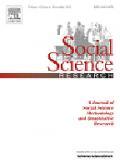
A popular explanation for race and ethnic disparities in academic achievement is that minorities are exposed to different peers and have different opportunities to make friends with high-achievers. Although we know that adolescents from different race and ethnic groups attend different schools and that they choose different friends, we do not know how these different opportunities affect the friends they make. This paper fills this gap by studying how the opportunities within adolescents’ schools affect race and ethnic differences in the academic characteristics of friends. Using data from the National Longitudinal Study of Adolescent Health and the conditional logit and opportunities framework, I account for adolescents’ different opportunities to make friends both within and across schools. Ignoring their different opportunities, Black and Latino adolescents’ nominated friends have significantly lower levels of achievement than white adolescents. After accounting for their different opportunities to make friends within and between schools, race and ethnic differences in the achievement characteristics of friends disappear. If Black and Latino adolescents’ opportunity structures were identical to white adolescents’, their probabilities of nominating high-achieving friends would not differ.